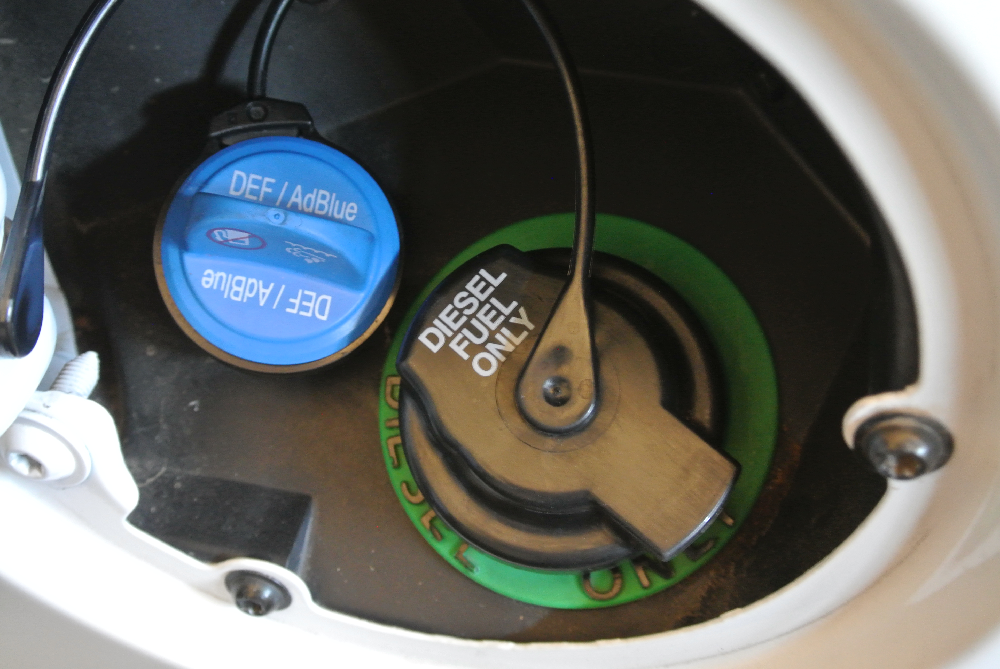12 Advantages of a Diesel Engine
1. Diesel Engines are more Efficient
One of the most significant advantages of a diesel engine compared to gasoline powered engines is that diesels are significantly more efficient. The engines are capable of converting approximately 45-50 percent of the fuel energy to power. The majority of gasoline engines are only able to convert approximately 30 percent of the gasoline energy to power the automobile. Additionally, diesels have a higher compression ratio than gasoline models (between 12-16 to one compared to 8-12 to one). Modern variants of the engines also benefit from not requiring a throttle plate like gasoline engines do. The absence of these plates allows the engine to avoid pumping losses which are energy losses that occur on gasoline powered engines when they attempt to intake air past the partially closed plates.
2. Diesel Engines are more Reliable
Over the past 50+ years, diesel engines have proven themselves to be significantly more reliable than gasoline powered engines. One of the biggest reasons for this is the fact that a diesel engine does not require a high-voltage ignition system, and they also do not emit RF (radio frequency) that can cause issues with a vehicle’s electronic system. As long as car owners keep up with oil changes and other routine maintenance on the vehicle, it is not unheard of to see a diesel engine far outlast the other components in a vehicle. Some drivers have kept their diesel cars to the 4-500,000 mile range of the auto. With modern turbo-technology being increasingly popular for diesel owners, the past drawbacks for owning a diesel-powered car have also been significantly minimized.
3. Diesel Fuel Auto-Ignites
A big advantage of driving a car or truck powered by a diesel engine is that diesel fuel automatically ignites to power the engine. This advantage provides a big benefit since by not requiring spark plugs or wires, the overall maintenance costs of the automobile are significantly lowered as compared to gasoline powered cars and trucks. Even though a diesel engine uses a four-stroke combustion cycle like a gasoline engine (intake, compression, combustion, and exhaust), it directly injects the fuel to the combustion chamber. The heat of the compressed air then ignites the fuel delivering the big benefit of not requiring spark plugs to ignite the fuel to keep the engine running. This advantage allows the engine to rely on fewer components to continue operations delivering a big advantage to consumers.
4. Fuel Cost is Significantly Lower
Although car drivers in the United States may not realize it with the price per gallon for diesel fuel being higher than gasoline (it is lower in Europe), the overall fuel cost for kilowatt for diesel fuel runs between 30 to 50 percent lower than for gasoline powered engines. Although the fuel requires less work to refine than gasoline, the price per gallon of diesel in the United States is more dramatically impacted by the overall demand signal from consumers for the fuel. Since diesel powered automobiles are not as popular in the U.S. as in Europe, the oil refineries do not have as large of a demand signal to produce the fuel which helps drive the overall cost up. Even with this price difference; however, diesel remains the cheaper alternative for consumers.
5. Lower Cost of Ownership
A big advantage for owners of vehicles that use a diesel engine is that the automobile will have an overall lower cost of ownership for lifetime of the vehicle when compared against a gasoline powered car of the same type. Recent studies have shown that over a five year ownership period, these savings can reach almost $7,000 USD for diesel cars. The primary savings comes from the lifetime fuel savings for the vehicle and a lower depreciation amount that gasoline cars have. For car and truck owners who will look to resell their vehicle, diesel-powered autos will typically have a 60 to 70 percent higher resell value as well. The savings are high enough to account for the higher initial purchase price for diesel cars and trucks, but require consumers to take a longer view on the overall savings than the initial purchase price of the auto.
6. Diesel Gasoline is Safer
Over the years, diesel gasoline has been proven to be significantly safer than regular gasoline for several reasons. First, diesel is fundamentally more difficult to catch on fire or burn than regular gas and will not normally explode when exposed to a high heat source. Next, since diesel fuel does not release gasoline fumes like regular fuel, the possibility of fuel vapors igniting and causing a vehicle fire is much lower. All of these factors contribute to providing increased protection for consumers in the event of a major car accident when driving their automobiles on the busy highways in both Europe, the United States, and other locations throughout the world.
7. Less Carbon Monoxide is Produced
Diesel engines produce significantly less carbon monoxide than gasoline powered ones do. This advantage also proves useful in non-automotive settings since diesel generators can be used in environments that gasoline exhaust would prove fatal (in mines, submarines, etc.) They are not carbon monoxide free; however, so auto owners must still take care to not start a diesel car or truck up in a garage with the door closed or other similar locations. The exhaust still contains a limited amount of the pollutant that can prove deadly if appropriate ventilation is not available.
8. It is Easier to Turbo-Charge Diesel Engines
Compared to gasoline engines, it is much easier to turbo-charge a diesel engine. Designers invest a significant amount of time and effort into ensuring that a turbo-charged gasoline engine will not be put under excessive pressure and detonate or explode. Diesel engines on the other hand, can endure significantly more stress when turbo-charged, and they are only limited by the top-end strength of the engine. In practice, a turbo-charged diesel engine is normally a large displacement engine that is more powerful at lower RPMs. Since the volume of diesel exhaust is high, the turbine section of the turbo must support a large intake volume of air in order to keep the engine cylinders filled to be most effective. When making the decision to turbo-charge a diesel, consumers should ensure they pay special attention to the oil-to-air pressure differentials of a diesel vice what a gasoline engine requires to ensure the maximum improvement in performance.
9. Diesels run Synthetic Fuels Easily
Another big advantage of a diesel engine is that they can run synthetic fuels easily. Although non-petroleum-based synthetic fuels run hotter than diesel or traditional gasoline, most diesel engines can run the alternative fuel without any significant modifications to the engine or vehicle. Gasoline engines; however, require significant modifications in order to run on these fuels without causing major damage to the engine and supporting components. Industry has been experimenting with the use of biobutanol as a synthetic fuel option that does not require any modification to gasoline powered engines. In the short term; however, diesel engines are the better choice when making the decision to shift to synthetic fuel use.
10. Diesel Engines Run Cooler
Diesel engines always run cooler than their gasoline counterparts. Since the engines are more efficient, there is less waste heat created during the engine operation. Since a diesel uses approximately 40% less fuel to produce the same power output as a gasoline engine of the equivalent size, there is less overall heat generated during the combustion process. One of the primary reasons for the better efficiency (and less overall heat generation) is the extremely high compression rations used by diesel engines to create power. The fuel is not injected in a diesel engine until the piston is at the top of the compression stroke, so the engine is only compressing air. A gasoline engine; however, has its compression ratio limited by the gasoline’s ability to pre-ignite. There are new technologies being developed for gas engines to minimize this effect for future car engines.
11. Diesels are Built to Last
Since diesel engines were first put in automobiles, the engines have demonstrated that they will last longer than gasoline engines. The primary reason for the longer lifespan is that out of necessity, diesel engine parts must be built to a higher standard than gas engine parts to support the combustion cycle. Additionally, diesel fuel has superior lubrication properties that regular gasoline. If the appropriate maintenance is accomplished on a diesel engine, it will last up to twice as long as a gas engine of the same size. It is not uncommon for diesel engines to last to the 500,000 mile point while gasoline engines will commonly wear out at 200,000 miles.
12. Diesel Engines Produce Peak Torque at Low RPMs
Compared to gasoline engines, diesels have the advantage of producing more torque than gasoline powered ones. They also do so at lower RPMs which helps to improve the overall fuel economy for the automobile or truck. This trait makes diesel engines the most suited for powering vehicles that must tow on a regular basis. The high torque output of the engines at lower revolutions also makes the engines very suited for uses in the farming and construction industries. When the higher torque output is combined with the lower overall fuel cost for diesel engines, it makes choosing a diesel powered truck more attractive to consumers.





